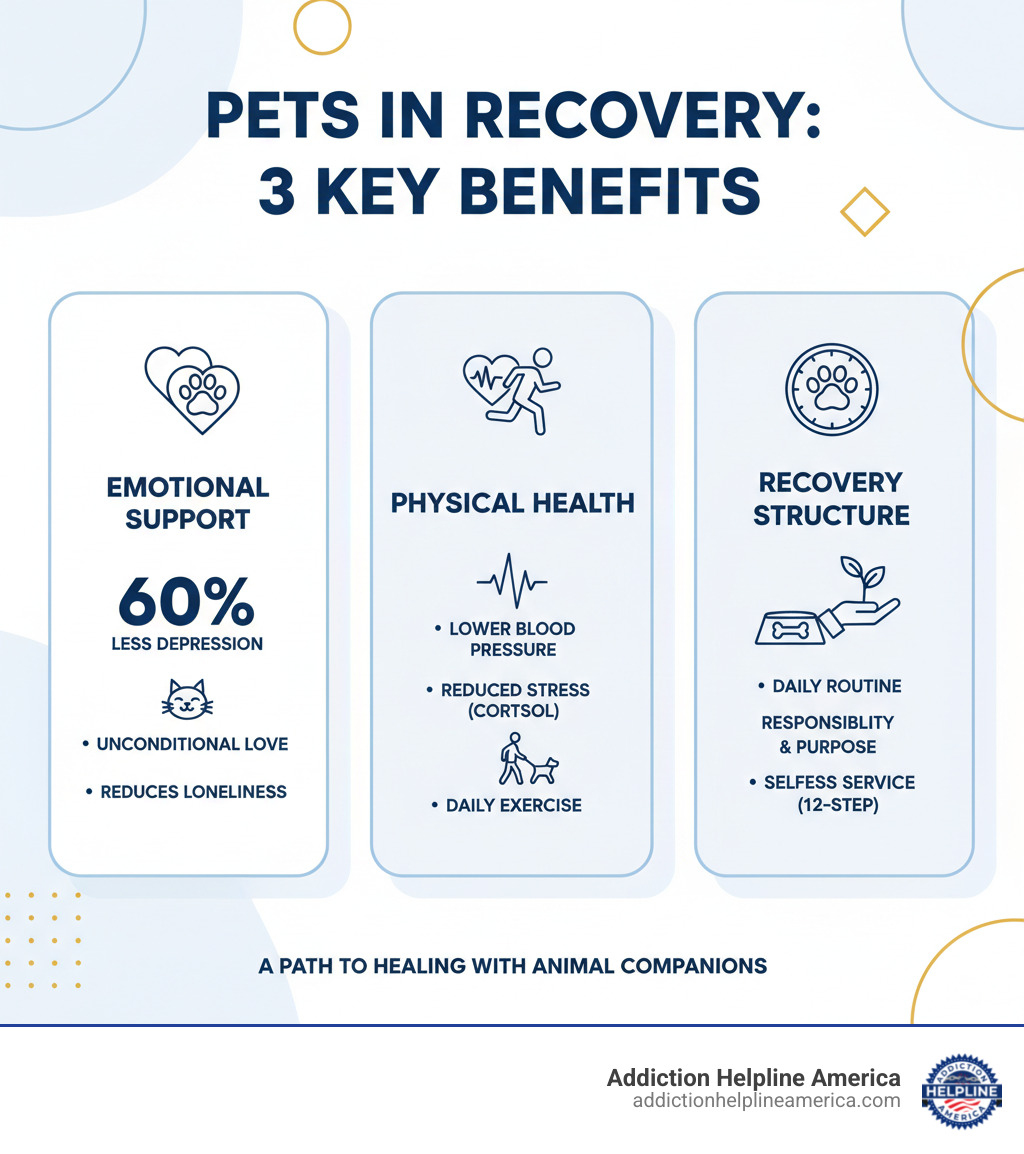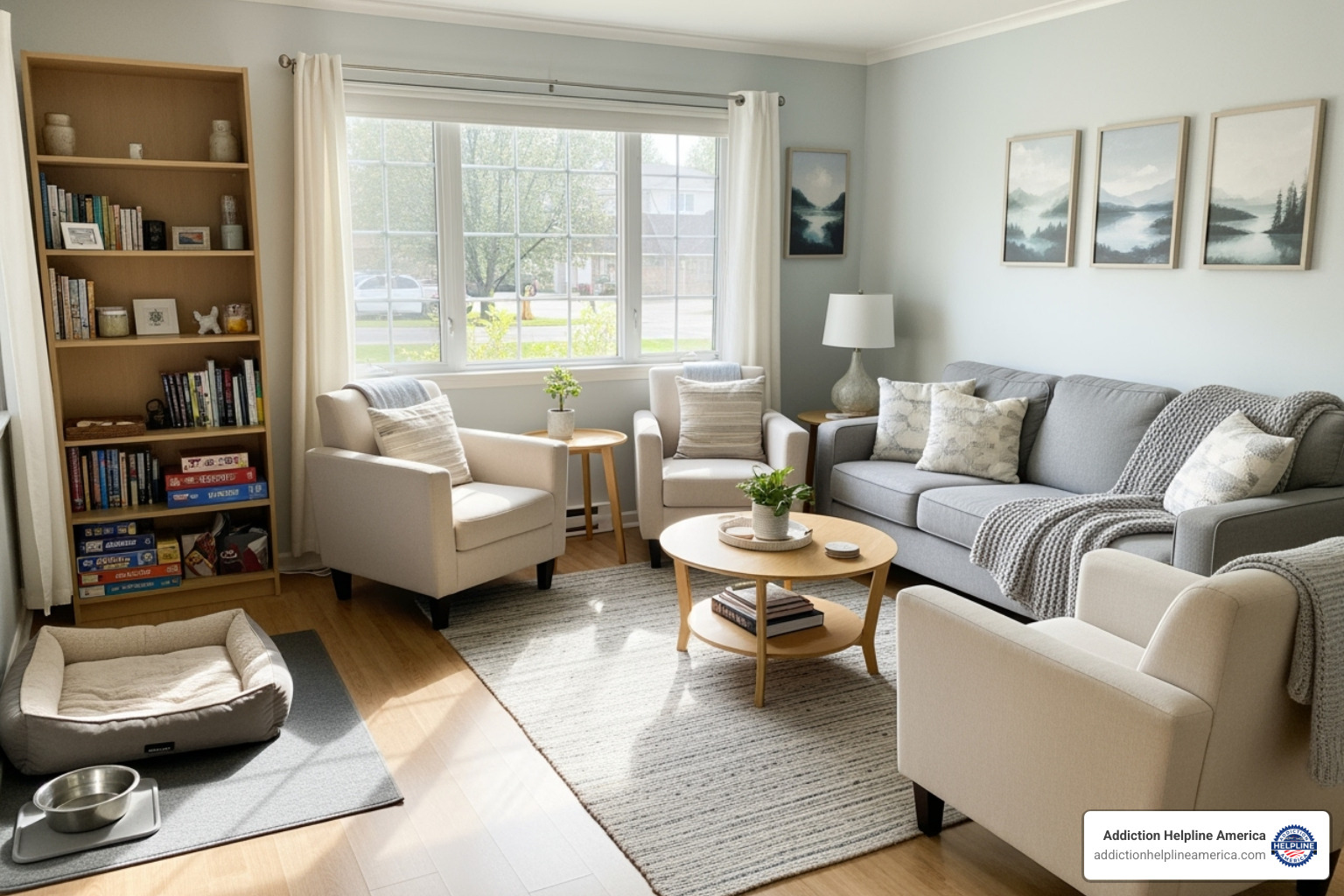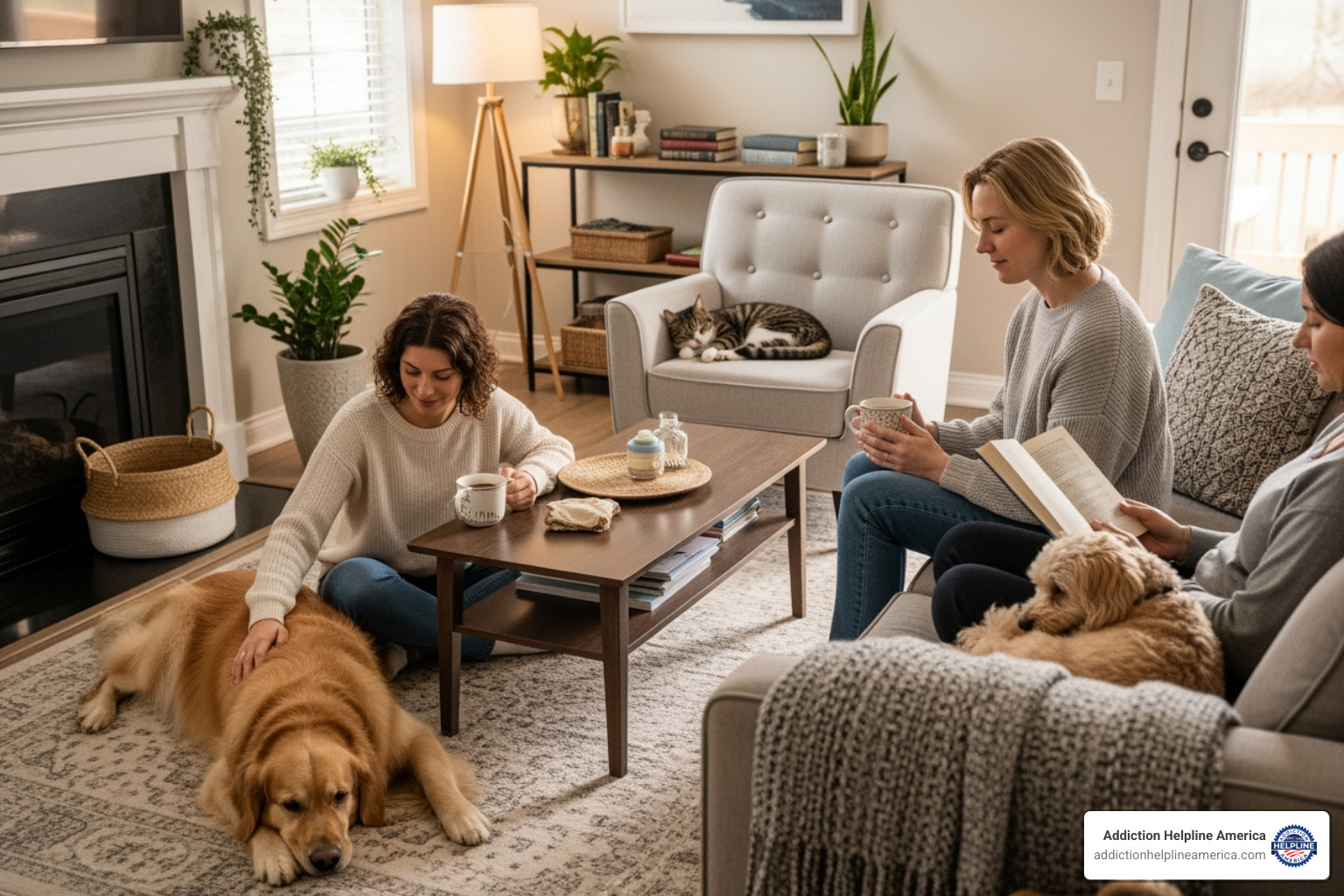
The Unbreakable Bond: Why Leaving a Pet Behind Isn’t an Option
Pet friendly sober living facilities are recovery homes that allow residents to bring their beloved animals on their journey to sobriety. These programs recognize that pets provide crucial emotional support, companionship, and motivation to stay clean.
Quick Guide to Pet-Friendly Sober Living Options:
- What’s allowed: Most facilities accept dogs and cats; other pets evaluated case-by-case
- Extra costs: Expect pet deposits ($200-500) and monthly pet fees ($25-100)
- Your responsibilities: Daily care, cleaning, following house pet rules, attending recovery meetings
- Key benefits: Reduced anxiety, built-in routine, emotional support, increased accountability
- Requirements: Pets must be vaccinated, spayed/neutered, and well-behaved
The journey to recovery is deeply personal, and for many, it involves a beloved pet. Leaving your dog behind isn’t an option; pets offer unconditional love and can be a game-changer in sobriety.
Finding treatment shouldn’t mean abandoning the furry family member who provides comfort. The human-animal bond runs deep, and studies show that 74% of pet owners report mental health improvements from their animal companion.
This guide will help you find quality recovery housing for you and your pet. We’ll cover what to expect, how to choose the right program, and the responsibilities involved.
At Addiction Helpline America, we’ve helped thousands steer addiction recovery, including connecting people with pet friendly sober living options. Our experience shows that when people don’t have to choose between recovery and their pets, they’re more likely to commit fully to their healing journey.
Why Your Pet is a Powerful Ally in Recovery
When fighting for sobriety, every day can be an uphill battle. Your furry companion becomes more than a pet—they become a powerful ally in your recovery journey.
Emotional support is the most immediate gift your pet offers. Recovery often brings loneliness and anxiety. Your pet won’t judge you for past mistakes; they simply offer unconditional love and a warm presence that says, “You’re not alone.”
Returning to a pet friendly sober living home after a difficult session to a wagging tail or gentle purr can shift your entire emotional state. This companionship makes recovery feel less overwhelming.
Pets also create structure when your world feels chaotic. Building routine becomes natural with feeding schedules, walks, and playtime. This fosters responsibility in a gentle, manageable way. These non-negotiable tasks give you a sense of purpose beyond your own struggles, as you matter to a living being who depends on you.
This daily care teaches selflessness—a core principle in 12-step philosophy. Caring for a pet naturally shifts your focus outward, helping you practice recovery principles every time you put your pet’s needs first.
The physical benefits are just as real. The CDC highlights the health benefits of pet ownership, including stress reduction and lowering blood pressure. Petting an animal releases calming hormones while stress hormones decrease.
Increased physical activity happens naturally. Walks, interactive play, and general care help release natural mood boosters that fight depression and anxiety.
Perhaps most importantly, pets teach mindfulness—the art of living in the moment. When you’re throwing a ball or scratching behind their ears, you’re fully present, not dwelling on the past or worrying about the future.
The Science Behind Pets and Mental Wellness
The healing power of pets is backed by solid research. Studies show that 74% of pet owners report mental health improvement after getting their companion. For people in recovery, this statistic represents real hope.
Anxiety management is more achievable with a pet. Petting an animal lowers cortisol (stress hormone) levels while boosting oxytocin (the bonding hormone), calming your body.
For depression coping, the numbers are equally impressive. Pet owners are 60% less likely to suffer from depression. In a sober living environment, this natural mood support can make a huge difference.
Increased physical activity from pet care releases endorphins, your body’s natural antidepressants. It’s not just walks, but the small movements of daily care.
The scientific studies on the human-animal bond consistently show that pets help us practice mindfulness naturally. Focusing on your pet’s needs is a form of living in the moment—a crucial skill for maintaining sobriety.
This is measurable science showing how the human-animal bond supports mental wellness. In recovery, having a pet means having a 24/7, non-judgmental support system.
What to Expect in a Pet-Friendly Sober Living Environment
A pet friendly sober living home feels different from traditional recovery housing. You’ll notice pet beds, water bowls, and toys. The atmosphere is often warmer and more home-like, with the gentle presence of animals creating a calming energy.
The biggest difference is obvious—there are furry residents alongside human ones. This changes the daily rhythm of the house. You might wake up to dogs being let out for morning walks or share couch space with a cat during evening discussions.
With your companion by your side comes real responsibility. You’ll handle all aspects of pet care—feeding, walks, grooming, and cleaning up after accidents. In a shared living space, this means being extra diligent about hygiene. Other residents count on you to keep common areas clean and odor-free.
Your pet care duties become part of your daily recovery routine, creating natural structure. This responsibility extends to making sure your pet doesn’t disturb others, like keeping barking to a minimum.
Let’s be honest about the challenges. Extra costs are part of the deal. Most facilities charge pet fees ranging from $25 to $100 monthly, plus security deposits of $200 to $500. These fees cover additional cleaning and potential damage.
Allergies among residents can create tricky situations, and staff work to match compatible roommates. Pet conflicts can also arise, as not every animal gets along.
The key is understanding that everyone—humans and pets—is working toward a supportive environment where recovery can flourish.
Common Rules and Guidelines for Pets
Most pet friendly sober living facilities welcome dogs and cats, though they’ll often have size or breed restrictions. Other animals like birds or fish are typically evaluated on a case-by-case basis.
Pet requirements are straightforward but non-negotiable. Vaccinations must be current, and facilities require vet records. Spaying and neutering is almost always required to reduce behavioral issues and control the pet population.
The temperament evaluation is crucial. Some facilities meet your pet beforehand, while others require documentation from a vet confirming your animal is well-socialized and non-aggressive. This ensures everyone’s safety and comfort.
Leash rules are standard. Your dog will need to be leashed in common areas and outside, unless there’s a secure, designated off-leash area. Designated pet areas help keep things organized for feeding, sleeping, and bathroom breaks.
These guidelines aren’t meant to be difficult. They’re designed to help residents and their animals live together peacefully while focusing on recovery.
How to Find and Choose the Right Pet-Friendly Sober Living Program
Finding the right pet friendly sober living program might feel overwhelming when you’re already dealing with so much. But here’s the thing – you shouldn’t have to abandon your furry best friend to get the help you need. We’ve worked with countless people who were hesitant to enter recovery because they couldn’t bear leaving their pets behind. These specialized programs exist precisely because that bond matters so much.
Researching facilities is your starting point. Begin with online searches using phrases like “pet-friendly sober living near me” or “recovery housing that allows pets.” Don’t limit yourself to just the first page of results – sometimes the perfect place is a few clicks deeper. Recovery directories and specialized websites can be goldmines for finding options you might not find otherwise.
Once you have a handful of potential facilities, the real work begins. This is where asking the right questions becomes crucial. Admissions coordinators are there to help – they’ve heard every question imaginable, so don’t hold back. One person we helped found their perfect match by asking about the facility’s emergency pet care policy, something they never would have thought to ask until their dog needed urgent vet attention.
Facility tours are absolutely essential if possible. Photos can be deceiving, and you need to see how the space actually works for both you and your pet. During your visit, watch how staff interact with any pets already there. Do they seem genuinely fond of animals, or just tolerating them? Notice whether other residents’ pets seem happy and well-cared for.
Here are the essential questions to ask an admissions coordinator about their pet policy:
- Pet types and restrictions: What animals are welcome? Any size, breed, or age limits?
- Health requirements: What vaccinations, spaying/neutering, or health certificates do you need?
- Financial details: What are the pet deposits and monthly fees? What exactly do these cover?
- Daily expectations: What are your responsibilities for feeding, walking, and cleaning?
- Space and amenities: Are there fenced yards, nearby parks, or designated pet areas?
- Problem resolution: How do they handle pet conflicts or behavioral issues?
- Veterinary care: Are there nearby vets? What happens if your pet gets sick?
- Community integration: How do pets fit into daily schedules and house meetings?
The goal isn’t just finding a place that allows pets – it’s finding one where both you and your companion can truly thrive during your recovery journey.
Evaluating a Potential Pet-Friendly Sober Living Home
When you’re checking out a potential pet friendly sober living home, look beyond the “pet-friendly” sign on their website. A truly supportive environment understands that your pet’s wellbeing directly impacts your recovery success.
Staff attitude towards animals tells you everything you need to know about a facility’s commitment. Do they light up when they talk about the house pets? Can they share specific examples of how animals have helped other residents? We’ve seen places where staff genuinely celebrate the human-animal bond, and others where pets feel more like a reluctant accommodation. You want the former.
Physical space matters tremendously for both daily comfort and long-term success. Look for spacious living areas where your pet won’t feel cramped or stressed. Fenced yards are ideal for dogs, giving them safe space to run and play. If there’s no yard, ask about nearby parks and walking routes. One resident we worked with chose their facility specifically because it was two blocks from a dog park – that daily social time became a cornerstone of both their routines.
The concept of peer support models extends beautifully to pet-friendly environments. When residents support each other’s recovery, they naturally extend that care to each other’s animals too. This creates a unique dynamic where your pet becomes part of the community fabric. Research shows that recovery housing environments with strong peer support lead to better outcomes, and this principle holds true when pets are part of the equation.
Red flags in any sober living situation become even more concerning when your pet’s safety is involved. Unsafe conditions like broken fencing, aggressive animals, or unsanitary living spaces put both you and your pet at risk. No clear rules about pet behavior, feeding schedules, or conflict resolution usually means chaos down the road. If a facility can’t give you straight answers about their pet policies, or if current residents seem uncomfortable discussing their animals, trust your instincts and keep looking.
You’re not just choosing a place to live – you’re choosing a community where both you and your beloved companion will spend crucial months of your recovery journey.
Understanding Your Responsibilities in a Pet-Friendly Sober Living Community
Living in a pet friendly sober living community means balancing recovery and pet care in ways that actually strengthen both. It might seem like juggling act at first, but most residents find that caring for their pets creates a beautiful rhythm that supports their sobriety.
Your recovery comes first, always. This means attending meetings regularly, participating in house activities, and following all sobriety requirements. But here’s what’s amazing – your pet can actually reinforce these commitments. Knowing your dog needs that morning walk gets you up and moving, even on days when depression tries to keep you in bed. Having to come home to feed your cat creates natural boundaries around social situations that might become risky.
House chores take on new dimensions when pets are involved. Beyond your regular cleaning duties, you’ll need to stay on top of pet hair, litter boxes, and any accidents that happen. This isn’t just about being a good roommate – it’s about showing respect for the privilege of having your companion with you. We’ve seen residents develop incredible attention to detail through pet care that carries over into other areas of their lives.
Financial responsibility for your pet extends beyond just the facility’s pet fees. Veterinary bills, food, toys, and unexpected medical expenses all fall on you. This responsibility can be incredibly grounding – it gives you concrete reasons to maintain employment and manage money wisely. One resident told us that budgeting for their cat’s needs taught them financial skills they’d never developed before.
Respecting other residents becomes more complex but also more rewarding when pets are involved. Not everyone grew up with animals, and some people may feel nervous around your dog or allergic to your cat. Creating a harmonious environment means keeping your pet well-behaved, cleaning up immediately after any accidents, and being sensitive to others’ comfort levels.
The beautiful thing about pet-friendly sober living is how it mirrors the broader recovery community – everyone looking out for each other, sharing responsibilities, and celebrating small daily victories together. Your pet becomes part of that extended family, often bringing joy and comfort to residents who miss their own animals back home.
Frequently Asked Questions About Pet-Friendly Recovery Homes
When you’re considering pet friendly sober living, it’s natural to have questions. At Addiction Helpline America, we hear these concerns regularly from people who want to keep their beloved companions close during recovery. Let’s address the most common questions to help put your mind at ease.
Are there extra fees for bringing a pet to a sober living home?
Yes, most pet friendly sober living homes do charge additional fees for pets, and honestly, this makes sense when you think about it. Pets can cause extra wear and tear on a property, require additional cleaning, and sometimes need special accommodations.
You’ll typically encounter pet deposits ranging from $200 to $500. Think of this like a security deposit for your furry friend – it’s refundable as long as your pet doesn’t cause any damage. Then there’s usually a monthly pet rent between $25 and $100. This ongoing fee helps cover things like extra cleaning supplies, maintenance of pet areas, and sometimes even communal pet amenities.
The exact amounts vary quite a bit depending on where you’re looking, the size of your pet, and what the facility offers. Some places include pet waste bags or cleaning supplies in their monthly fee, while others expect you to provide everything yourself. Covering potential damages is usually the main concern for facilities, so they want to make sure they’re protected financially.
The most important thing? Ask about all pet-related costs upfront. You don’t want any surprises when you’re already dealing with the stress of starting your recovery journey. A good facility will be completely transparent about what you’ll pay and what’s included.
What happens if my pet has behavioral issues or doesn’t get along with others?
This worry keeps a lot of people up at night, and we totally understand why. Living in close quarters with other people and their pets can be tricky, but most facilities have thought this through carefully.
Most pet friendly sober living homes will want to meet your pet before you move in. They’re looking for signs of aggression, excessive barking, or destructive tendencies. This temperament evaluation isn’t meant to be scary – it’s actually protecting both you and your pet by making sure the environment will work for everyone.
If issues do come up after you’ve moved in, there’s usually a mediation process. The house manager might sit down with you to discuss what’s happening and brainstorm solutions. Sometimes they’ll recommend professional training – and yes, you’d typically pay for this yourself, but many residents find it incredibly helpful for both their pet and their own confidence.
House policies around pet behavior are usually pretty clear from day one. Things like cleaning up accidents immediately, keeping noise levels reasonable, and making sure your pet respects other residents’ space are standard expectations.
In worst-case scenarios where a pet poses a real safety risk or causes ongoing major problems, the facility might require the pet to be rehomed. This is rare and usually only happens when other solutions haven’t worked. The key is being proactive about your pet’s needs and communicating openly with staff when challenges arise.
Can I bring an emotional support animal (ESA) to any sober living home?
This is where things get a bit more complex legally, but it’s important information to understand. There’s a real difference between ESA vs. pet policies, and knowing this distinction could open doors for you.
An emotional support animal isn’t just a beloved pet – it’s an animal prescribed by a licensed mental health professional to help with symptoms of a mental or emotional disability. Under the Fair Housing Act, housing providers generally must make reasonable accommodations for people with disabilities, which can include allowing an ESA even in facilities that normally don’t allow pets.
The catch? You need proper documentation from a licensed mental health professional. This isn’t something you can get online from a questionable website – it needs to be legitimate documentation that clearly explains your disability-related need for the animal.
Communicating with the facility early in the process is crucial. They have the right to request your documentation and verify its authenticity. They can also deny an ESA request if the animal would pose an undue burden or create safety concerns for other residents.
Here’s the practical reality: if you have a legitimate ESA with proper documentation, you have legal protections that might allow you to bring your animal to facilities that aren’t typically pet-friendly. However, if you’re looking at pet friendly sober living homes anyway, the process is usually much smoother since they already welcome animals and understand the therapeutic benefits pets provide.
The bottom line is being honest about your situation and having the right paperwork ready. Most facilities want to help you succeed in recovery, and they understand that for many people, that includes having their emotional support animal by their side.
Conclusion: Start Your Healing Journey, Together
Throughout this guide, we’ve explored the power of pet friendly sober living and why it can be a game-changer in recovery. The benefits go beyond simple companionship—your furry friend becomes a true ally, offering emotional support that combats the loneliness of early sobriety. The unconditional love your pet provides creates a safe emotional anchor.
We’ve seen how pets naturally build routine and responsibility into your daily life. Morning walks and feeding schedules are recovery tools that create structure and a sense of purpose. This aligns with 12-step philosophy, teaching selflessness that is crucial for long-term sobriety.
The science backs this up. With 74% of pet owners reporting mental health improvements and pets helping to reduce stress and lower blood pressure, your companion literally helps heal your body and mind. The physical activity from walks and play releases endorphins, while petting an animal can lower cortisol and bring you into the present moment.
Finding the right fit is crucial, and we hope this guide has given you the tools to make an informed choice. Remember to ask about pet policies, fees, and house rules. Look for facilities where staff genuinely understand the human-animal bond.
The beautiful truth is that you don’t have to choose between recovery and your pet. These specialized programs exist because the addiction treatment field recognizes that your bond with your companion is healing, not a hindrance.
At Addiction Helpline America, we’ve helped thousands find their path to sobriety, including connecting them with pet friendly sober living options. We understand that recovery isn’t one-size-fits-all, and we’re here to help you find a solution that works for you.
If you’re ready to start this journey with your loyal companion by your side, we’re here to help. Our team provides free, confidential guidance to connect you with the right recovery program from our extensive network of treatment centers and sober living facilities.
Take the next step in your recovery with your companion by your side.
Pet Friendly Sober Living: Sober Living That Allows Pets
For individuals continuing recovery after treatment, sober living provides structure, and at the same time, it allows more freedom. Pet friendly sober living homes become, therefore, an additional source of comfort and consistency for those who have pets. Such settings not only help residents to maintain their sobriety but also allow them to take care of the companions who emotionally support them.
Pet friendly sober living is essentially about security both for the people and their pets.
What Pet Friendly Sober Living Homes Offer
Sober living homes are places free from the use of substances where residents abide by shared rules and support each other. Pet friendly homes take the idea of support one step further by allowing for responsible pet ownership.
Common features include:
- Drug- and alcohol-free housing
- Peer accountability and shared responsibilities
- House rules that support recovery
- Pet accommodation guidelines for safety and care
Residents are expected to balance recovery commitments with daily responsibilities.
Our helpline is 100%
free & confidential
If you or someone you care about is struggling with drug or alcohol addiction, we can help you explore your recovery options. Don’t face this challenge alone—seek support from us.
Programs
Resources
Will my insurance
cover addiction
treatment?
We're ready to help
Find the best
drug or alcohol treatment
center
Are you or a loved one struggling with addiction? Call today to speak to a treatment expert.
















